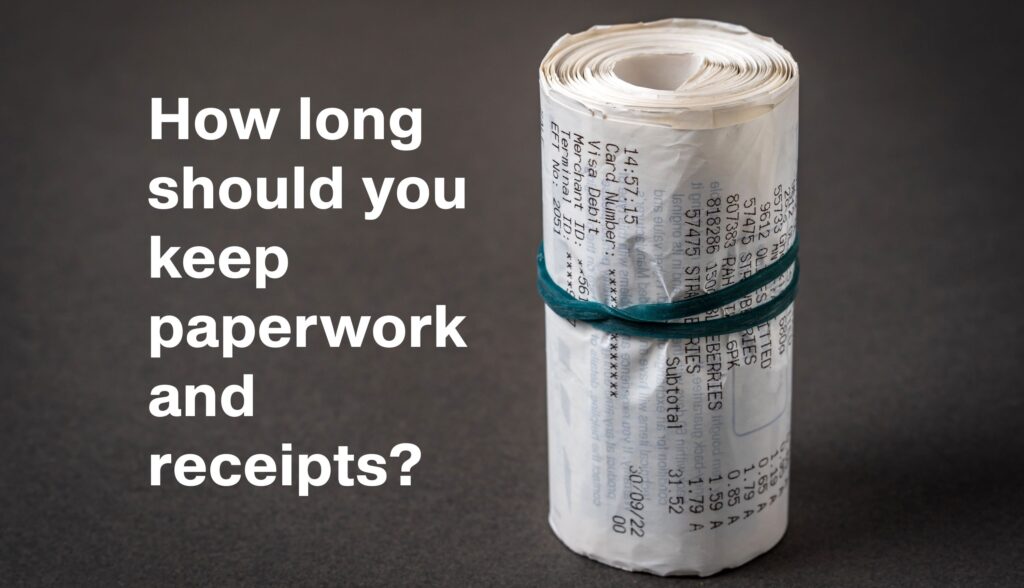
How long should you keep paperwork and receipts?
|
|
We often meet sole traders who are surprised they have to keep receipts long after they have filed their tax returns. Some sole traders don’t even realise they have to keep paperwork at all!
Why it’s important
To cut to the chase, you need to keep paperwork in case HMRC ever enquires into your income or costs. While the probability is very slim, it can and does happen.
We know you’re honest (or at least we hope you are) but, because the UK tax system relies on self-reporting (just like supermarket self-checkouts), HMRC needs to do spot checks. There are other situations that might trigger an HMRC investigation involving your business:
- They may need to look into the tax affairs of one of your suppliers or customers.
- Information received by third parties may give HMRC reason to believe something isn’t being properly declared.
- They may need to investigate several years of losses or large unexplained changes in your return inconsistent with comparable businesses.
Over the past few years, tax enquiries have increased. We believe this is a result of:
- Incorrect furlough claims,
- COVID grants not being declared, and
- The rise of side hustlers selling on Etsy and eBay.
In addition, technology has made it easier for HMRC to carry out checks. The latest figures (for 2023-24) indicate HMRC uncovered £41.8 billion worth of correcting errors and deliberate under-reporting. Eek!
How you know you’re being investigated
The first indication that you’re being investigated will be an official letter (not email) notifying you, containing information that a check has commenced. It will also give details about the process and your legal rights and obligations. HMRC is not obliged to reveal why you have been chosen.
The letter itself will state what documents are needed. HMRC has up to 4 years from the end of the tax year to conduct a discovery assessment and can go back 20 years if the taxpayer is found to be dishonest. While it may be impractical to keep all paperwork for two decades, we always recommend 7-10 years at least. However, with electronic files it’s now much easier to keep the data so less of a storage issue.
📢❕It’s crucial any sole trader who has ceased trading (either due to retirement or returning to employment) keeps their paperwork too! Even though you are no longer a sole trader, HMRC can still make an enquiry.
Information you may be asked for
👉Bank statements are the most important documents to retain. We recommend you print or save a PDF version of your bank accounts each year including PayPal and credit card statements.
👉Self-reporting taxpayers are expected to retain documents (paper or electronic) such as receipts, invoices and employment contracts (to verify salary and employment benefits).
👉If you rent property, you’ll need to keep rental agreements, mortgage statements and ownership details as well as receipts for professional fees, renovations and repairs.
👉VAT-registered businesses are required to retain valid VAT invoices.
These records must be filed or kept digitally, ensuring traceability, and linked to the relevant tax submissions. It goes without saying, but we’ll say it anyway: they must also be authentic, complete and legible!
Anything paid (or received) in cash must have a proper invoice or receipt. If an entry in the accounts is not enough, HMRC will request information from the supplier or customer should the individual be contactable and willing to supply it.
Third party information
HMRC may request information from third parties, such as customers, suppliers or financial institutions, to cross-check the taxpayer’s information.
📢❕The information in this blog post was correct at the time of writing. Please check with your accountant for the latest information or, if you don’t have an accountant, join the Financial Resilience Hub to get access to one of ours! Alternatively, keep an eye on HMRC’s website for updates.
See also:
👉How HMRC plans to use AI to assess the risk of tax evasion by businesses
👉Selling online – when do you need to tell HMRC?
👉VAT records – what do you need to keep?
👉When is a VAT invoice not a VAT invoice?
ABOUT THE AUTHOR

Helen Monaghan is a Chartered Management Accountant, accredited NLP Practitioner & Finance Coach. Both a psychology graduate and an accountancy graduate, she has authored three business books, which beautifully bring together psychology, finance, and tax to empower the reader about money. Helen is the CEO of HM Finance Coaching & Advisory Ltd, a company that provides financial education and business mindset coaching to small businesses across the UK, in addition to accountancy services for limited companies in Scotland and across the UK. Helen is also the founder of The Financial Resilience Hub – find out how we can support you, and your business, to be financially resilient through our monthly membership.
© Helen Monaghan






Responses